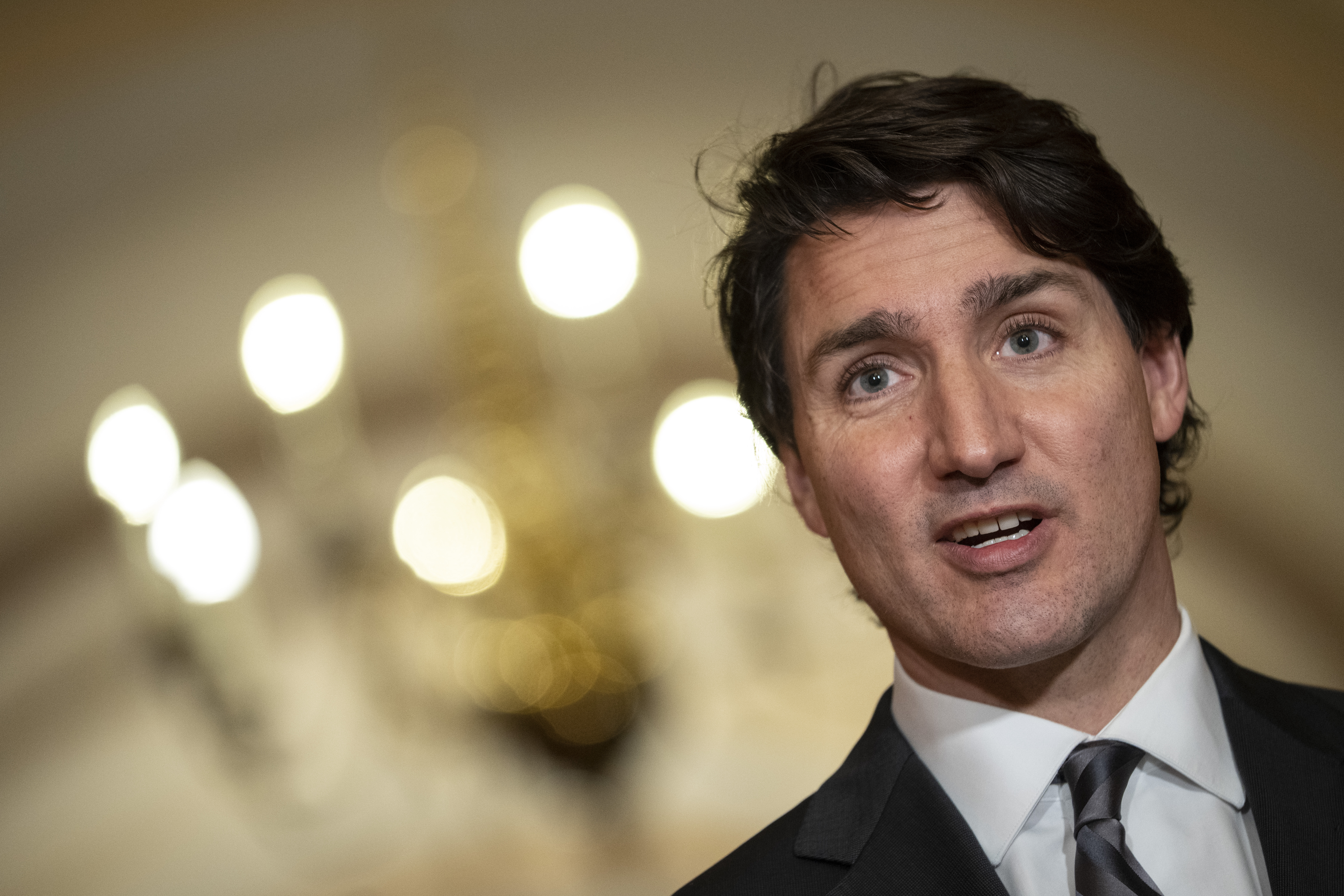The prime minister said the new sanctions will also be aimed at Putin’s “fellow architects of this barbaric war,” including the Russian president’s chief of staff Anton Vaino.
Trudeau stopped to speak about Ukrainian President Volodymyr Zelenskyy, whom he last spoke with Thursday.
“I am inspired by his resolve and his devotion to his country,” Trudeau said. “He is the embodiment of the courage of Ukrainian people and, just like him, Ukrainian people are showing incredible strength and resilience.”
Earlier Friday, the United States and the United Kingdom each announced plans to sanction Putin and Lavrov.
Canadian sanctions will also be levied against Belarus and its leaders for abetting Putin’s invasion of Ukraine.
“These will target 57 individuals and are in addition to the dozens of existing strong sanctions already leveled against [Belarusian President] Alexander Lukashenko’s regime for their repeated, systematic human rights violations and decades of oppression of their own people,” Trudeau said.
Canadian Foreign Affairs Minister Mélanie Joly said slapping sanctions on top officials — including Russia’s ministers of defense, finance and justice — will affect their decision-making.
“We want to make sure that we’re suffocating the Russian regime — that’s our goal,” Joly told the press conference.
SWIFT DEBATE
British Prime Minister Boris Johnson, whom Trudeau spoke with earlier in the day, has also urged allies to shut Russia out of SWIFT immediately. Other allies haven’t shown the same eagerness.
White House press secretary Jen Psaki said Friday that removing Russia from SWIFT “certainly remains an option on the table.”
But she noted that “many would argue that there are ways that Russia, the Russian leadership, could get around that over the course of time.”
Trudeau said conversations about SWIFT are ongoing with allies “who are reflecting on this very carefully.”
Sandra McCardell, an assistant deputy minister at Global Affairs Canada, told reporters during a briefing Thursday that only a “consolidated, concerted” effort by a number of countries to ban Russia from SWIFT would have an effect. She said it would have had little impact if Canada had moved on its own.
WAVES OF SANCTIONS
Hours after Russian forces — some via Belarus — launched Thursday’s invasion, Canada announced sanctions targeting 35 individuals and 27 key financial institutions.
Canadian measures are aimed at members of the Russian elite and their families as well as the Wagner Group, Gazprom and major Russian banks, including Sberbank and VTB.
The Trudeau government also announced sanctions earlier in the week on 351 members of the Russian State Duma who voted in favor of independence for the breakaway regions of Donetsk and Luhansk. The list includes hockey legend-turned politician Vyacheslav Fetisov.
Trudeau has also prohibited Canadians from engaging in certain transactions and activities in those territories, prevent dealings in Russian sovereign debt and sanctioned two major Russian financial institutions.
TROOPS AT THE READY
Canada will send up to 460 additional personnel to Europe, adding to the 800 already deployed to support NATO. The Canadian military is also sending a battery of M777 artillery guns to Latvia, a second frigate to the region and is retasking a CP-140 Aurora long-range patrol aircraft in the area.
The government said around 3,400 Canadian Armed Forces personnel are authorized to deploy to the NATO Response Force should they be required.
Defense Minister Anita Anand told reporters Friday that the Canadian troops are on “high readiness.”
“Any incursion by Russia into a NATO country will have severe consequences and will be subject to Article 5 — and the idea that an attack on one, is an attack on all,” Anand said.
Earlier Friday, NATO announced the deployment of parts of the response force to its eastern flank.
It is the first time the treaty’s response force has been used for collective security, NATO Secretary General Jens Stoltenberg told reporters.
“This goes far beyond Ukraine,” Stoltenberg said. “This is about how Russia is actually challenging, contesting core values for our security.”
PROVINCES JOIN GLOBAL RESPONSE
Canadian provinces have also started taking steps to apply pressure on Russia.
Ontario, the most-populous province, and Nova Scotia announced bans Friday on sales of Russian booze in all government-run liquor stores. The Ontario stores, known as LCBOs, are the world’s largest buyers and retailers of alcohol.
Doug Ford, Ontario’s premier, also urged President Joe Biden to stop his opposition to the Keystone XL pipeline project as a way to reduce U.S. dependence on Russian oil and put more of a squeeze on Putin’s cash flow.
“Rather than buying dirty oil off of Russia — and I’ll call it dirty oil — we need to start producing our oil … we have endless amounts of oil,” Ford told reporters in London, Ont. “But we need President Biden to make sure he opens up, and changes his mind, on the [Keystone] XL pipeline.”
Canada’s Ukrainian community, which is one of the world’s largest outside of Ukraine and Russia, is also pressuring the Trudeau government and allies to do more.
Early Friday, a statement by the Ukrainian Canadian Congress called for the immediate enforcement of a no-fly zone over Ukrainian territory to protect civilians from Russian airstrikes and bombardment.
The organization also asked for the delivery of anti-aircraft, anti-rocket and naval defense systems to Ukraine, a full trade embargo on Russia, the seizure of all assets held in Western countries by Russian oligarchs and government officials. The congress also demanded Russia’s removal from SWIFT.
